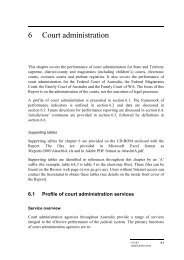Dr Linda Botterill and Professor Bruce Chapman (PDF - 74 Kb)
Dr Linda Botterill and Professor Bruce Chapman (PDF - 74 Kb)
Dr Linda Botterill and Professor Bruce Chapman (PDF - 74 Kb)
You also want an ePaper? Increase the reach of your titles
YUMPU automatically turns print PDFs into web optimized ePapers that Google loves.
have taken different approaches to h<strong>and</strong>ling this feature of the family farm. The Henderson<br />
Poverty Inquiry of the 1970s concluded that low farm incomes were likely to be the result of<br />
sub-optimal rates of structural adjustment in the farm sector <strong>and</strong> suggested that the best<br />
policy response was through measures to promote agricultural structural adjustment<br />
(Musgrave et al. 1975). This was the direction taken in the Rural Adjustment Schemes of the<br />
late 1970s <strong>and</strong> the 1980s. In 1992, it was recommended by the consultants reviewing the<br />
Rural Adjustment Scheme that welfare be removed from the scheme (Synapse Consulting<br />
(Aust) Pty Ltd 1992). Ministers agreed, <strong>and</strong> the Farm Household Support Scheme was set up,<br />
followed by Farm Family Restart <strong>and</strong> Farm Help. The National <strong>Dr</strong>ought Policy made a clear<br />
distinction between the farm family <strong>and</strong> the business <strong>and</strong> the 1997 review of rural<br />
adjustment policy argued for business <strong>and</strong> welfare programs to be clearly distinguished<br />
(McColl et al. 1997, p vii). However the 2005 <strong>and</strong> 2007 changes blurred this distinction.<br />
Farm poverty has not been measured systematically since the Henderson Inquiry. The EC<br />
Relief Payment <strong>and</strong> related programs have been based on assumptions about the existence of<br />
farm poverty, its nature <strong>and</strong> causes. As has been argued elsewhere<br />
policy needs to be based on evidence rather than simply on assumptions <strong>and</strong> the issue<br />
of the treatment of the farm asset needs to be reassessed. Research is required into<br />
the extent, nature <strong>and</strong> causes of farm poverty in Australia. Methodological <strong>and</strong><br />
definitional problems associated with poverty research cannot be avoided – <strong>and</strong> in<br />
addition to the difficulties experienced in general poverty research, work will be<br />
needed on the treatment of farm assets <strong>and</strong> the consideration of wealth in<br />
determining farm welfare. As far as possible the welfare of the farm family will need<br />
to be disentangled from that of the farm business. (<strong>Botterill</strong> 2007, p 44)<br />
It is therefore recommended that<br />
the government undertake an inquiry into farm poverty to determine the<br />
nature <strong>and</strong> extent of poverty among Australia’s farmers <strong>and</strong> any amendments<br />
necessary to the welfare safety net to make it accessible to farmers on an<br />
equitable basis.<br />
If a need is identified for a farmer-specific welfare program, this should be delivered on the<br />
basis of individual needs. Basing access to the welfare safety net on geographical boundaries<br />
creates inequities <strong>and</strong> the causes of low farm incomes should not be relevant if farmers do<br />
not have the resources to meet basic family needs.<br />
It is recommended that<br />
if a specific unaddressed welfare need is identified, the Exceptional<br />
Circumstances Relief Payment be removed from the National <strong>Dr</strong>ought Policy<br />
<strong>and</strong> replaced by a st<strong>and</strong>ing farm welfare program, delivered on terms that are<br />
equitable with the rest of the community, <strong>and</strong> on the basis of the individual<br />
family’s needs <strong>and</strong> not on the basis of geographically-based exceptional<br />
circumstances declarations.<br />
Removing the eligibility for welfare from any drought support program would reinforce the<br />
business focus of the National <strong>Dr</strong>ought Policy <strong>and</strong> also greatly reduce the politicisation of the<br />
program. Media images of drought-affected families are powerful in evoking public support<br />
for governments to ‘do something’. If these families are receiving welfare support on an<br />
equitable basis, governments are better placed to implement policies in a manner consistent<br />
<strong>Botterill</strong> <strong>and</strong> <strong>Chapman</strong> Page 4
















